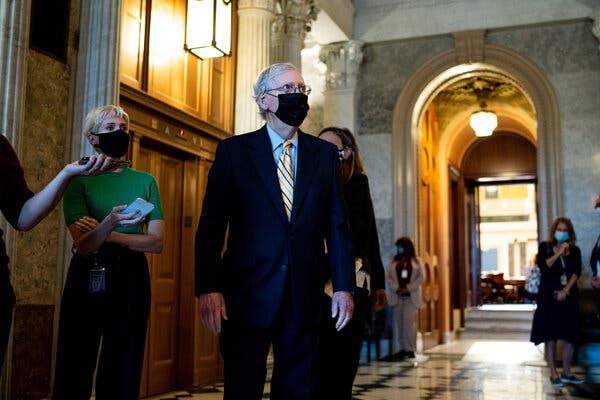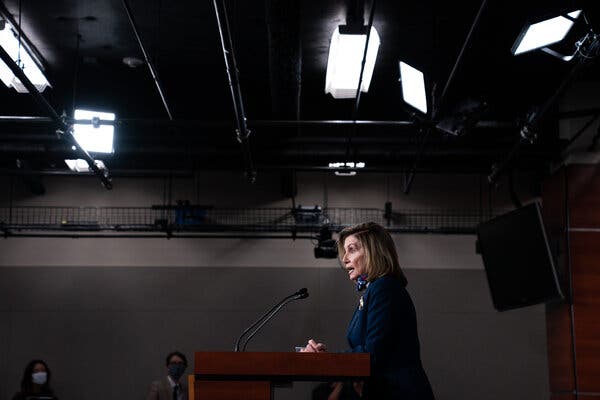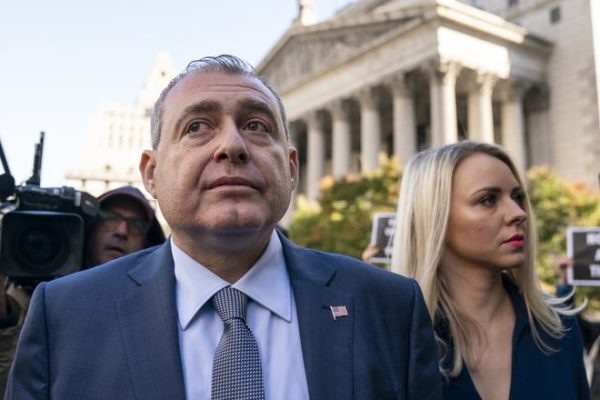Advertisement
A show vote in the Senate reflected a continuing partisan divide that appears increasingly likely to scuttle any recovery package to address the toll of the pandemic before the November election.

WASHINGTON — Prospects for any additional stimulus to address the coronavirus pandemic’s devastating toll before the election darkened considerably on Thursday, when a whittled-down Republican plan failed in the Senate on a partisan vote.
Democrats voted unanimously to block the proposal from advancing, calling it inadequate to meet the mounting needs for federal aid, in the latest indication of a lack of political will to reach an agreement, even as critical federal aid for individuals and businesses has run dry.
It was a nearly party-line vote whose outcome was never in doubt. The proposal amounted to a fraction of the $1 trillion plan Republicans had offered in negotiations with Democrats, who in turn are demanding more than twice as much.
A failure to compromise would leave millions of jobless Americans in potentially dire straits, as they exhaust traditional jobless benefits and states run out of additional funds that President Trump steered to the unemployed by executive order last month. It would also strand a wide swath of small business owners who have endured steep drops in revenue as the pandemic chilled economic activity, with little prospect of a return to normal levels for months to come.
“Along with a pandemic of Covid-19, we have a pandemic of politics,” Senator Pat Roberts, Republican of Kansas, told reporters after the vote. “Looking to the House — and for that matter, our colleagues across the aisle — it’s a sort of a dead-end street.”
He spoke after the measure failed on a 52-to-47 vote, falling short of the 60 it would have needed to advance, as Republicans worked to foist blame on Democrats for the lack of progress on a compromise and give their own vulnerable incumbents a chance to vote for an aid measure before they face voters.
In a Twitter post, Senator Marco Rubio, Republican of Florida, flatly declared, “Congress isn’t going to pass more #Covid_19 relief before the election.”
His comments echoed a pessimistic assessment this week by Treasury Secretary Steven Mnuchin, a Trump administration point man in the stalled bipartisan talks, who said although many Americans needed help, he was unsure an agreement was possible.
If it is not, economists and champions of more stimulus warned that by effectively cutting off what had been a large stream of federal aid, Mr. Trump and lawmakers would risk the health of a recovery that has slowed, stalled or even begun to reverse by various real-time measures of activity. Nearly 30 million people were receiving unemployment benefits in the week that ended Aug. 22. Almost one-quarter of small businesses in weekly census surveys said they would need additional financial assistance or capital in the months to come.
“At a time when small businesses are increasingly pessimistic about their ability to survive without additional support, we are now faced with the very real prospect — in fact, the likelihood — of no further relief from Congress until after the election,” said John Lettieri, the president of the Economic Innovation Group, a think tank that has led a collection of advocacy groups in pushing for long-term, low-interest loans to keep small companies afloat. “That is malpractice, plain and simple.”
Top lawmakers insisted that a bipartisan agreement remained possible, although recent phone calls between Speaker Nancy Pelosi and Mr. Mnuchin have failed to yield a breakthrough. And after Democrats unanimously blocked the Republican measure from advancing, their leaders counseled rank-and-file lawmakers to remain united behind demands for a much larger package.
“We don’t want to go home without a bill, but don’t be a cheap date,” Ms. Pelosi told House Democrats on a private call after the vote, according to two people who described the remarks on condition of anonymity. She added, “When you are in a negotiation, the last place to get weak knees is at the end.”
Mr. Trump, leaving Washington for Michigan on Thursday, told reporters, “Nancy Pelosi and Schumer don’t want to pass a stimulus bill because they think that helps me in the election.”
The president has attempted to act unilaterally to assist the recovery — and has recently held out the prospect of more executive actions, including perhaps redirecting federal funds to send direct payments to individual Americans. But economists and Mr. Trump’s own recent history suggest that any significant aid to the economy before the election would need to be provided by Congress, which controls federal spending.
On Thursday, the Federal Emergency Management Agency said that supplemental relief checks for unemployed workers, instituted by Mr. Trump in an executive memorandum last month, would soon end. The payments of $300 or $400 per worker per week, depending on a state contribution level, will have lasted only six weeks for participating states. Only 18 states have begun making the payments, according to Michele Evermore, senior researcher and policy analyst at the National Employment Law Project.
After swiftly approving several rounds of aid totaling nearly $3 trillion last spring, lawmakers and administration officials have failed to bridge deep divisions over another relief package.
While Democrats swiftly pushed a $3.4 trillion plan through the House in May, Senator Mitch McConnell, Republican of Kentucky and the majority leader, said he wanted to hit “pause” to determine whether more help was necessary, and waited until late July to propose any. By then, several Republican senators, wary of adding more to the ballooning national debt and unhappy with concessions Mr. Mnuchin made to Democrats in previous negotiations, balked at additional spending and panned the $1 trillion proposal.
After weeks of daily conference calls, Republicans ultimately hammered out a substantially scaled-back measure that would have provided about $350 billion in new funding and repurposed hundreds of billions more from the original stimulus law. The measure included federal aid for unemployed workers, small businesses, schools and vaccine development, as well as reviving weekly federal jobless benefits that lapsed at the end of July at $300 — half the original amount. Democrats have pushed for restoring extra federal unemployment payments at $600 per week.
It also omitted another round of stimulus checks to American families and any additional aid to state and local governments facing dire financial circumstances amid the pandemic — a top priority for Democrats. The resulting package was intended to answer the concerns of fiscal hawks who were reluctant to provide additional federal funding.
Senator Rand Paul of Kentucky was the only Republican to break with his party and vote against advancing the measure on Thursday.
Mr. McConnell cast the vote in starkly political terms. In remarks beforehand, he praised vulnerable Republicans staring down steep challenges in November for their contributions to the narrow package, and warned of the consequences of blocking the bill.
Democrats, he said, “can tell American families they care more about politics than helping them.”
After weeks of saying that they would not accept anything less than $2.2 trillion, top Democrats called the revised Republican proposal unacceptable, and charged that Mr. McConnell never intended to enact additional aid.
“McConnell is being his cynical self by saying, ‘I’ll just put something on there. It’ll look like we’re trying to do something, while we ignore the needs of the American people, where we shy away from defeating and crushing the virus,’” Ms. Pelosi said at her weekly news conference. Still, she insisted there was a chance for a deal.

She said she remained “optimistic” that the White House and Democrats could find enough common ground to pass another round of relief — but only if Republicans were willing to offer hundreds of billions of dollars more in funding for state and local governments.
Moderate lawmakers in both chambers are growing increasingly anxious about the prospect of leaving Washington in October without additional relief, a worry Democrats raised with their leaders during the private call on Thursday, according to one person familiar with the conversation. But Ms. Pelosi and Senator Chuck Schumer, Democrat of New York and the minority leader, who joined the House call, indicated that they planned to hold firm.
“If they come to us, we could get something done,” Mr. Schumer told Democrats on the call, according to a person familiar with the remarks.
Still, proponents of extending more help to small businesses, in particular, expressed discouragement over what has been a monthslong deterioration in hopes for a deal. Outside the Capitol on Wednesday, flight attendants gathered to urge lawmakers to approve an extension to an expiring payroll support program as airlines warned of looming furloughs without federal action.
“We can’t just afford to throw up our hands and say, ‘This isn’t working,’” said Caroline L. Harris, the vice president for tax policy and economic development at the U.S. Chamber of Commerce.
Luke Broadwater, Nicholas Fandos and Nelson D. Schwartz contributed reporting.



